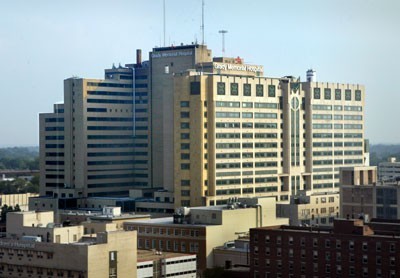ATLANTA - The race to save Grady Memorial Hospital Metro Atlanta's public health safety net appears to be approaching its final hurdle after more than six months of politicking, pondering and persuasion.
On Wednesday, the Fulton County Commission approved a plan transferring power over Grady to a nonprofit governing board. Next week, Dekalb County could follow suit, clearing the way for the new board to be seated.
The management overhaul comes with the promise of $300 million in new support enough to keep Grady afloat and pay for much-needed improvements in the hospital's crumbling infrastructure.
Already operating on the margins, the hospital had managed to limp along for years, relying on the local, state and federal government support while treating Atlanta's poorest.
Its budget of about $750 million was largely dependent on Medicaid patients; Grady is the state's largest Medicaid provider.
The hospital took a double blow in 2006 when the state legislature sliced $60 million out of the hospital's already strained budget and the hospital's indigent care bill swelled by $73 million.
It left a staggering gap between Grady's expenses and its income.
``It, in effect, sunk us,'' said Dr. Christopher Edwards, former vice-chair of the Fulton Dekalb Hospital Authority.
On top of all that, the state launched a new Medicaid/HMO program that saved the government $43 million but crippled Grady.
Services began suffering. Meeting payroll became a challenge.
``Because of this, we had to seek alternative funding,'' Edwards said. ``The business community certainly presented an option.''
Amid rising desperation, hospital's board turned to the Metro Atlanta Chamber of Commerce for help.
The Chamber agreed, but with a condition: Grady would have to radically transform its management. The hospital authority, appointed by local politicians, would have to yield power to a new nonprofit board. Having run out of alternatives, Grady said yes.
The power struggle over Grady has highlighted questions of race and challenged the way business has been done for decades in Atlanta.
State Sen. Vincent Fort, an outspoken advocate for Atlanta's poor, said the Chamber of Commerce is a latecomer supporting the city's public health needs.
Until recently, he said, ``the Chamber could not find their way to Grady ... This is about power, not healthcare, and that is an unfortunate situation.''
Through a spokeswoman for the Metro Atlanta Chamber of Commerce, Pete Correll co-chair of the Greater Grady Task Force and one of the proposed members of the new nonprofit board declined to comment to The Associated Press ahead of the Dekalb vote. Correll has said increased funding opportunities and confidence would accompany a change in leadership.
In Fort's view, Grady's problem was not about governance, but about resources. He suggested other ways to raise money, something like the half-cent sales tax the city adopted to pay for modernizing Atlanta's sewers.
The threat that Grady would close by the end of the year was a bluff, Fort thought. And Dec. 31 came and went with the lights still on, thanks in part to a $20 million shot in the arm from Fulton County to keep Grady going through the new year.
Meanwhile, momentum had been building for the hospital authority to approve a structure for the new nonprofit board.
Since the Chamber's recommendation in July, the governor, lieutenant governor and speaker of the house had all endorsed the plan and were offering millions as an incentive for Grady to go along. Fulton and Dekalb counties the only local governments paying into Grady's budget were also on board.
At a tumultuous Nov. 26 meeting, the authority voted to establish the 16-member nonprofit board. At one point, a scuffle broke out and Fort was restrained by the hospital's security guards.
The deal called for a lease agreement, The new board would control the hospital's daily operations. The current 10-member board would serve in an oversight capacity. On Jan. 28, the authority approved it.
At the same meeting, the board approved a deal with Wachovia Bank giving Grady a credit line of $35 million to $50 million.
The next day, Grady's CEO, Dr. Otis Story, resigned. He had been at the helm for less than a year, often at odds with Grady's leadership. Now he would not be a part of the new plan.
A week later Edwards announced his departure, and a list of nominees for the new nonprofit board was unveiled. The list, which identified 11 of the 16 proposed members, included black and white citizens from the business and healthcare communities.
The names did little to put Fort at ease.
``The people who were named were not engaged in this issue,'' Fort said. ``And the money is tied to a specific person. That person's going to drive the train.''
Fort is referring to Correll. To Fort, Correll a former Georgia-Pacific CEO represents the white takeover of Grady, which is currently run by a majority-black board, serves mostly black patients and was most recently headed by a black man.
``What they're basically saying is, 'We cannot trust black people to run that hospital,''' Fort said. ``The changes at Grady are a signal that Atlanta is changing.''
Fort sees Grady is the first domino as the business community eyes opportunities to usurp the city's black political power.
``What's next? MARTA? Hartsfield?'' Fort asked, referring to Atlanta's public transportation system and airport.
Edwards, meanwhile, plans to return to private life.
But when asked if he would be willing to serve on the nonprofit board, he said, ``If asked and needed, I would have to strongly consider it.''
On the Net:
Grady Health System: http://www.gradyhealthsystem.org
Saturday
July 5th, 2025
11:58AM

















